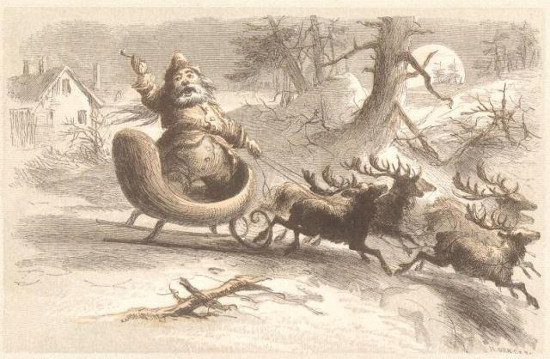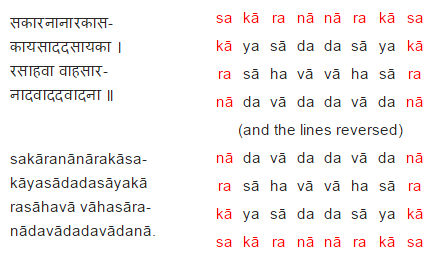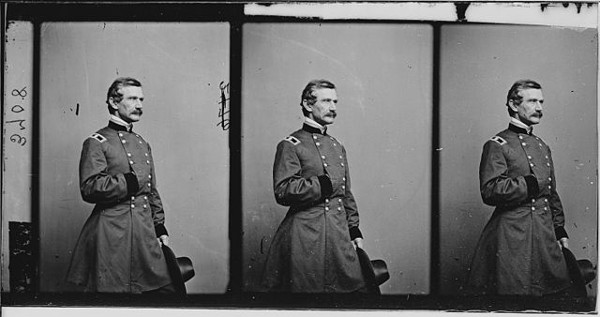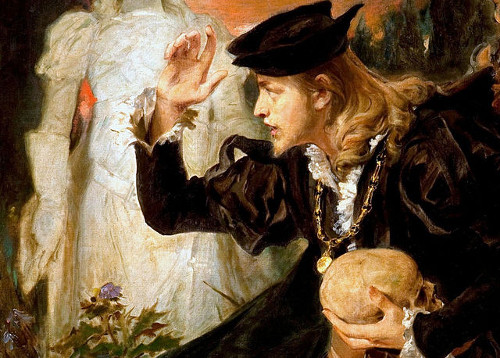
‘Twas the nocturnal segment of the diurnal period preceding the annual Yuletide celebration, and throughout our place of residence, kinetic activity was not in evidence among possessors of this potential, including that species of domestic rodent knows as Mus musculus.
Hosiery was meticulously suspended from the forward edge of the wood-burning caloric apparatus, pursuant to our anticipatory pleasure regarding an imminent visitation from an eccentric philanthropist among whose folkloric appellations is the honorific title of St. Nicholas.
The prepubescent siblings, comfortably ensconced in their respective accommodations of repose, were experiencing subconscious visual hallucinations of variegated fruit confections moving rhythmically through their cerebrums.
My conjugal partner and I, attired in our nocturnal head coverings, were about to take slumbrous advantage of the hibernal darkness when upon the avenaceous exterior portion of the grounds there ascended such a cacophony of dissonance that I felt compelled to arise with alacrity from my place of repose for the purpose of ascertaining the precise source thereof.
Hastening to the casement, I forthwith opened the barriers sealing this fenestration, noting thereupon that the lunar brilliance without, reflected as it was on the surface of a recent crystalline precipitation, might be said to rival that of the solar meridian itself — thus permitting my incredulous optical sensory organs to behold a miniature airborne runnered conveyance drawn by eight diminutive specimens of the genus Rangifer, piloted by a minuscule aged chauffer so ebullient and nimble that it became instantly apparent to me that he was indeed our anticipated caller.
With his ungulate motive power travelling at what may possibly have been more vertiginous velocity than patriotic alar predators, he vociferated loudly, expelled breath musically through contracted labia, and addressed each of the octet by his or her respective cognomen — “Now Dasher, now Dancer …” et al. — guiding them to the uppermost exterior level of our abode, through which structure I could readily distinguish the concatenations of each of the 32 cloven pedal extremities.
As I retracted my cranium from its erstwhile location, and was performing a 180-degree pivot, our distinguished visitant achieved — with utmost celerity and via a downward leap — entry by way of the smoke passage.
He was clad entirely in animal pelts soiled by the ebony residue from the oxidations of carboniferous fuels which had accumulated on the walls thereof. His resemblance to a street vendor I attributed largely to the plethora of assorted playthings which he bore dorsally in a commodious cloth receptacle.
His orbs were scintillant with reflected luminosity, while his submaxillary dermal indentations gave every evidence of engaging amiability. The capillaries of his malar regions and nasal appurtenance were engorged with blood that suffused the subcutaneous layers, the former approximating the coloration of Albion’s floral emblem, the latter that of the Prunus avium, or sweet cherry.
His amusing sub- and supralabials resembled nothing so much as a common loop knot, and their ambient hirsute facial adornment appeared like small tabular and columnar crystals of frozen water. Clenched firmly between his incisors was a smoking piece whose gray fumes, forming a tenuous ellipse about his occiput, were suggestive of a decorative seasonal circlet of holly. His visage was wider than it was high, and when he waxed audibly mirthful, his corpulent abdominal region undulated in the manner of impectinated fruit syrup in a hemispherical container.
He was, in short, neither more nor less than an obese, jocund, superannuated gnome, the optical perception of whom rendered me visibly frolicsome despite every effort to refrain from so being.
By rapidly lowering and then raising one eyelid and rotating his head slightly to one side, he indicated that trepidation on my part was groundless. Without utterance and with dispatch, he commenced filling the aforementioned appended hosiery with various articles of merchandise extracted from a dorsally transported cloth receptacle. Upon completion of this task, he executed an abrupt about-face, placed a single manual digit in lateral juxtaposition to his olfactory organ, inclined his cranium forward in a gesture of leave-taking, and forthwith affected his egress by renegotiating (in reverse) the smoke passage.
He then propelled himself in a short vector onto his conveyance, directed a musical expulsion of air through his contracted oral sphincter to the antlered quadrupeds of burden, and proceeded to soar aloft in a movement hitherto observable chiefly among the seed-bearing portions of a common weed. But I overheard his parting exclamation, audible immediately prior to his vehiculation beyond the limits of visibility: “Ecstatic yuletide to the plenary constituency, and to that selfsame assemblage, my sincerest wishes for a salubriously beneficial and gratifyingly pleasurable period between sunset and dawn!”
(Author unknown)




